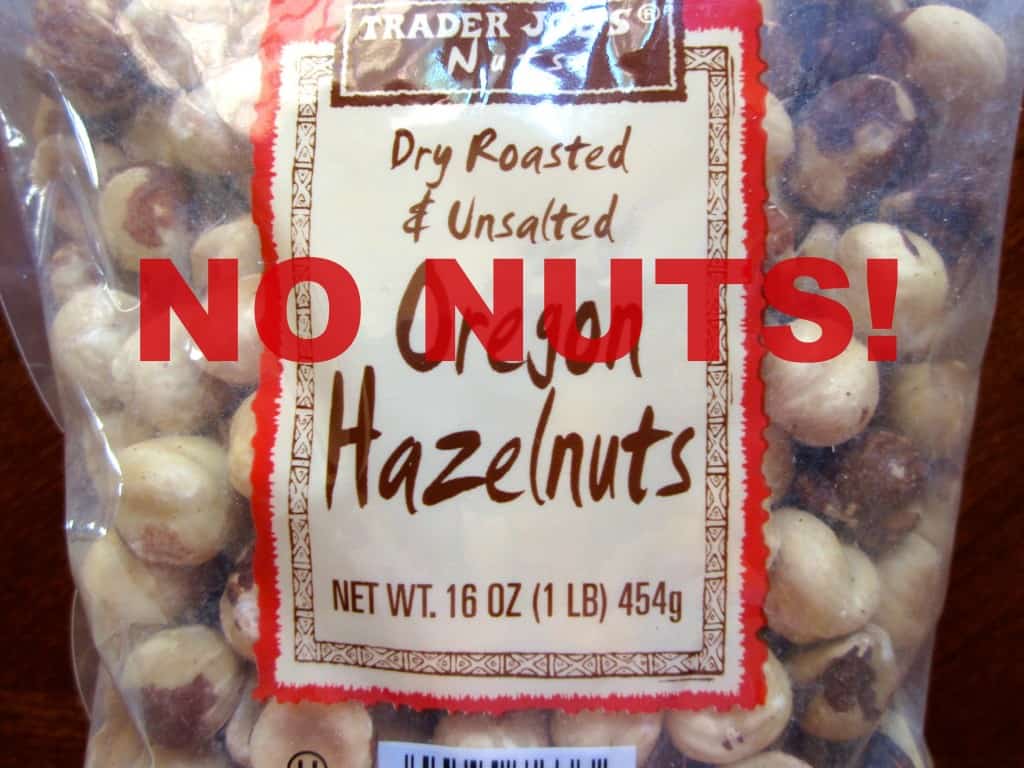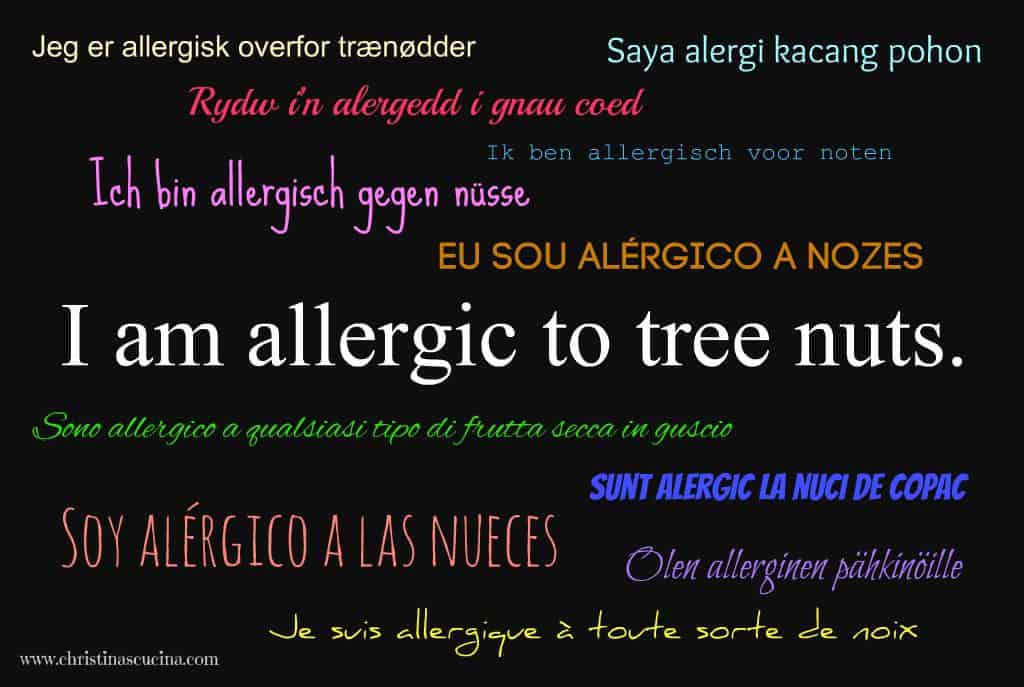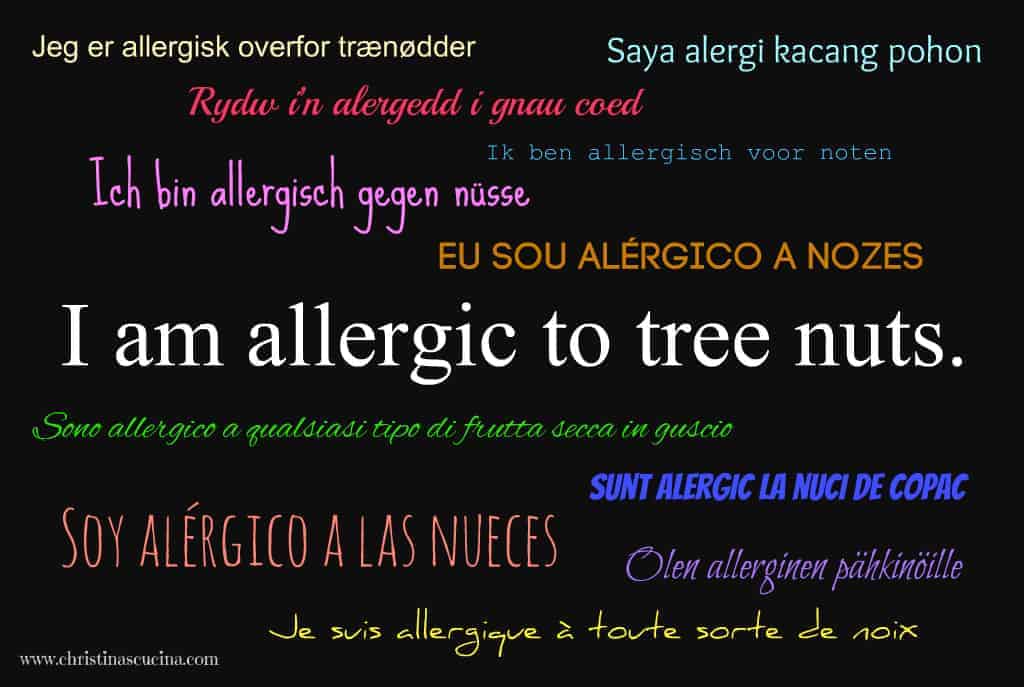How to Communicate “I am Allergic to Tree Nuts” in 50 Languages (Free Printable)
I hope this list of how to communicate, “I am allergic to tree nuts” in 50 languages will help prevent nut allergy sufferers from contact with tree nuts which could result in an anaphylactic reaction, hospitalization or even death while traveling.

I have a good reason for publishing this post on how to say “I am allergic to tree nuts” in many different languages.
You may or may not know that my daughter is severely allergic to all tree nuts, including pink peppercorns. For those of you who aren’t familiar with food allergies, this means if she ingests a trace amount of any tree nut, she could have an anaphylactic reaction, and die. (In essence, the allergic reaction closes her airway from the swelling which occurs.)
This is beyond serious: it’s life and death. It is also why I get upset when I hear the word “allergy” thrown around so much when it’s more of an intolerance, or dislike of a food.
So you might say that I’m extremely concerned when she’s traveling throughout other countries where there are language barriers, especially because she travels a lot.

When I looked up a translation for this message to warn servers and others of her nut allergy, it wasn’t the easiest to find. Then I found The Swedish Nomad, which included 50 languages to communicate a peanut allergy, so I thought, ‘Why not do the same for tree nuts?’ This information can truly save lives.

Although my reason for doing this was for my own daughter, I’d love for everyone, and anyone who needs it, to also have it.
Please share this post (and this post about other nut allergies) with anyone you know who is allergic to tree nuts (or has children) who may be traveling and could use this list of translations. I’ve included a free printable copy below to make it easier to print/share.
DISCLAIMER: Because I am mostly relying on web translations, please know that I cannot be 100% sure that the translations are absolutely correct as I do not speak 50 languages. I did ask some friends for translations so those in BOLD are correct. Please check the countries you will be visiting to make absolutely certain the translation is written as it should be.

How to say “I am allergic to tree nuts” in 50 languages
FREE PRINTABLE BELOW SO YOU CAN POINT AND SHOW AS NEEDED
(especially for a language you can’t read)
Afrikaans – “Ek is allergies vir boomboontjies.”
Albanian – “Unë jam alergjik ndaj arra të pemëve”
Arabic – “أنا حساسية من المكسرات شجرة (‘ana hisasiat min almukasarat shajara)”
Armenian – “Ես ալերգիկ եմ ծառի ընկույզով (Yes alergik yem tsarri ynkuyzov)“
Azerbaijani – “ağac qozu alerjisi”
Basque – “zuhaitz fruitu lehorrak alergia naiz”
Belarus – “У мяне алергія на арэхі (U mianie alierhija na arechi)”
Bosnian – “Ja sam alergičan na drveće”
Bulgariska – “аз съм алергична към орехови дървета (az sŭm alergichna kŭm orekhovi dŭrveta)”
Catalan – “sóc al·lèrgic a les nous de l’arbre”
Chinese – “我對樹堅果過敏 (Wǒ duì shù jiānguǒ guòmǐn)“
Croatian – “Ja sam alergičan na stabla”
Czech – “Jsem alergický na stromové ořechy.”
Danish – “Jeg er allergisk overfor trænødder.”
Dutch – “Ik ben allergisch voor noten.”
Estonian – “Olen allergiline pähklitele.”
English – “I am allergic to tree nuts”
Finnish – “Olen allerginen pähkinöille.”
French – “Je suis allergique à toute sorte de noix.” (There is no French word for “tree nuts”.)
German – “Ich bin allergisch gegen nüsse.”
Greek – “Έχω μια αλλεργία στους καρπούς με κέλυφος (Écho mia allergía stous karpoús me kélyfos).”
Haitian Creole – “Mwen fè alèji ak nwa pyebwa yo.”
Hebrew – “אני אלרגי לאגוזים.”
Hindi – “मुझे ट्री नट्स से एलर्जी है (mujhe tree nats se elarjee hai).”
Hungarian – “Allergiás vagyok a fa dióra.”
Icelandic – “Ég er með ofnæmi fyrir trjáhnetum.”
Indonesian – “Saya alergi kacang pohon.”
Italian – “Sono allergico a qualsiasi tipo di frutta secca in guscio.”
Japanese – “木の実アレルギーがあります(Konomi arerugī ga arimasu).”
Korean – “트리 너트 알레르기가 있습니다. (teuli neoteu alleleugiga issseubnida).”
Latvian – “Es esmu alerģija pret koku riekstiem.”
Lithuanian – “Aš alergiškas medžių riešutams.”
Macedoni – “Јас сум алергичен на дрво ореви. (Jas sum alergičen na drvo orevi).”
Maori – “Kei te mate ahau ki nga nati rakau.”
Mongolian – “Би мод самартай харшилтай байна (Bi mod samartai kharshiltai baina).”
Norwegian – “Jeg er allergisk mot tre nøtter.”
Polish – “Jestem uczulony na orzechy drzewne.”
Portuguese – “Eu sou alérgico a nozes.”
Romanian – “Sunt alergic la nuci de copac.”
Russian – “У меня аллергия на лесные орехи (U menya allergiya na lesnyye orekhi).”
Serbian – “Алергичан сам на орахе (Alergičan sam na orahe).”
Slovak – “Som alergický na orechy stromov.”
Spanish – “Soy alérgico a las nueces.”
Swahili – “Mimi ni mzio wa karanga za mti.”
Swedish – “Jag är allergisk mot trädnötter.”
Thai – “ฉันแพ้ถั่วต้นไม้ (C̄hạn phæ̂ t̄hạ̀w t̂nmị̂).”
Turkish – “Ağaç fındıklarına alerjim var.”
Ukrainian – “У мене алергія на горіхи (U mene alerhiya na horikhy).”
Vietnamese – “Tôi bị dị ứng với các loại hạt cây.”
Welsh – “”Rydw i’n alergedd i gnau coed.”
I hope you print this “I am allergic to tree nuts” list to give to someone with severe nut allergies. It could save their life.

How to Say "I am Allergic to Tree Nuts" in 50 Languages
Special Equipment
- 1 printer
Ingredients
- paper
Instructions
- PRINT THIS SO YOU CAN POINT AND SHOW AS NEEDED
- (especially for a language you can't read)
- Afrikaans – “Ek is allergies vir boomboontjies.”
- Albanian – “Unë jam alergjik ndaj arra të pemëve"
- Arabic – "أنا حساسية من المكسرات شجرة ('ana hisasiat min almukasarat shajara)"
- Armenian – "Ես ալերգիկ եմ ծառի ընկույզով (Yes alergik yem tsarri ynkuyzov)"
- Azerbaijani – “ağac qozu alerjisi”
- Basque – “zuhaitz fruitu lehorrak alergia naiz”
- Belarus – “У мяне алергія на арэхі (U mianie alierhija na arechi)"
- Bosnian – “Ja sam alergičan na drveće”
- Bulgariska – "аз съм алергична към орехови дървета (az sŭm alergichna kŭm orekhovi dŭrveta)"
- Catalan – “sóc al·lèrgic a les nous de l'arbre”
- Chinese – “我對樹堅果過敏 (Wǒ duì shù jiānguǒ guòmǐn)"
- Croatian – “Ja sam alergičan na stabla"
- Czech – “Jsem alergický na stromové ořechy."
- Danish – “Jeg er allergisk overfor trænødder.”
- Dutch – “Ik ben allergisch voor noten.”
- Estonian – “Olen allergiline pähklitele.”
- English – “I am allergic to tree nuts”
- Finnish – “Olen allerginen pähkinöille.”
- French – “Je suis allergique à toute sorte de noix.” (There is no French word for "tree nuts".)
- German – “Ich bin allergisch gegen nüsse.”
- Greek – “Έχω μια αλλεργία στους καρπούς με κέλυφος (Écho mia allergía stous karpoús me kélyfos).”
- Haitian Creole – “Mwen fè alèji ak nwa pyebwa yo.”
- Hebrew – “אני אלרגי לאגוזים.”
- Hindi – “मुझे ट्री नट्स से एलर्जी है (mujhe tree nats se elarjee hai).”
- Hungarian – “Allergiás vagyok a fa dióra.”
- Icelandic – “Ég er með ofnæmi fyrir trjáhnetum.”
- Indonesian – “Saya alergi kacang pohon.”
- Italian – “Sono allergico a qualsiasi tipo di frutta secca in guscio.”
- Japanese – “木の実アレルギーがあります(Konomi arerugī ga arimasu).”
- Korean – “트리 너트 알레르기가 있습니다. (teuli neoteu alleleugiga issseubnida).”
- Latvian – “Es esmu alerģija pret koku riekstiem.”
- Lithuanian – “Aš alergiškas medžių riešutams.”
- Macedoni – “Јас сум алергичен на дрво ореви. (Jas sum alergičen na drvo orevi).”
- Maori – “Kei te mate ahau ki nga nati rakau.”
- Mongolian – “Би мод самартай харшилтай байна (Bi mod samartai kharshiltai baina).”
- Norwegian – “Jeg er allergisk mot tre nøtter.”
- Polish – “Jestem uczulony na orzechy drzewne.”
- Portuguese – “Eu sou alérgico a nozes.”
- Romanian – “Sunt alergic la nuci de copac.”
- Russian – “У меня аллергия на лесные орехи (U menya allergiya na lesnyye orekhi).”
- Serbian – “Алергичан сам на орахе (Alergičan sam na orahe).”
- Slovak – “Som alergický na orechy stromov.”
- Spanish – “Soy alérgico a las nueces.”
- Swahili – “Mimi ni mzio wa karanga za mti.”
- Swedish – “Jag är allergisk mot trädnötter.”
- Thai – “ฉันแพ้ถั่วต้นไม้ (C̄hạn phæ̂ t̄hạ̀w t̂nmị̂).”
- Turkish – “Ağaç fındıklarına alerjim var.”
- Ukrainian – “У мене алергія на горіхи (U mene alerhiya na horikhy).”
- Vietnamese – “Tôi bị dị ứng với các loại hạt cây.”
- Welsh – "”Rydw i’n alergedd i gnau coed."
Notes
This is not a normal post for me. I hope you forgive me for sending this, although it is actually related to both food and travel. Thank you!


I do not know how to say “I am allergic to garlic“ in 50 languages, I do make sure that I know how to say it where ever I go in whatever language I need! While my allergy isn’t life or death, knowing how to say this is very important as a roam the globe.
Very true! Allergies are horrible.
This is a great resource for people. I was surprised in Spain how many things said, “Sin Gluten.” Not nuts, but just an example of how there’s definitely a strong concern for allergies/dietary restrictions everywhere.
Yep, unfortunately allergies are growing in number :(
This is great Christina! You never know when you will be in a situation where you might need to clarify a nut allergy!
Absolutely, and it’s not something that can wait. I hope it helps a lot of travelers with nut allergies.
Oh. My. Goodness. Christina, this post is vital out there and thank you for publishing this. I’m blessed not to have anyone in the family who is allergic like this but boy, I’ll be sharing it as there are, alas, too many people who do. They should keep a copy of a print-out of this page on them.
Up until Denisa, we never knew anything about allergies, but you learn very quickly when your child has a life-threatening one. Sad, but true. Hope this helps others, too.
This is so smart, Christina. We’re lucky to have no allergy issues, but I certainly know the severity of the allergens’ consequences, especially on young children. Thank you.
That’s actually a misconception, Mimi. More teens and young adults end up having reactions and deaths than young children. Parents are watching what their little ones eat, and teens feel they are invicible and take more chances. It’s such a terrible situation.